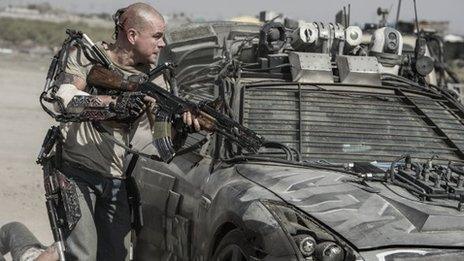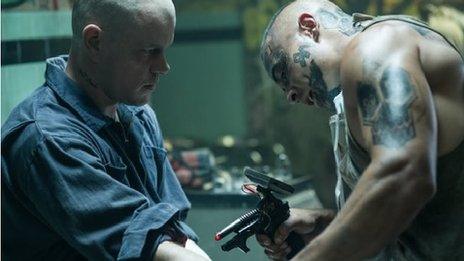Elysium: A politically charged 'popcorn sundae'
- Published

Elysium was largely shot in the world's second biggest garbage dump in Mexico. Matt Damon says it "was one of the most difficult shoots of my life".
In 2009, Neill Blomkamp was hailed as a hero of "sci-fi socialism", when his film District 9 used a script about aliens to convey a strong message about human xenophobia and racial segregation.
Now the South African-born director has delivered his follow-up, Elysium, which "deals with the growing discrepancy between rich and poor in the world".
"We set the story in the future, in the year 2154," says Blomkamp.
"Earth has become a third-world planet, and all the rich people can escape to live on a space station called Elysium, where illness can be cured easily with access to the latest technology.
"There is no suffering for them, while the poor are literally imprisoned and suffer here. The residents of Elysium will do anything to keep them out and protect their own luxurious lifestyle."
The 33-year-old film-maker, who moved from South Africa to Canada as a teenager, adds that "healthcare, immigration and class" are his targets, and "it's not really the future I'm talking about".
"It's not science fiction. This is now. The divide between rich and poor is getting more and more extreme."
Matt Damon, who has the starring role in the film, points out that "Elysium is like Beverly Hills, and Earth is somewhere like Baghdad, even though the film is technically set in a futuristic Los Angeles.
"It was embarrassing for all of us during filming, because half the movie executives actually do live in Beverly Hills. We're already living in Elysium. We're aware of it."
Although the Elysium scenes, full of pristine lawns, swimming pools and sun loungers, were shot in Vancouver, the rest of filming took place in the world's second largest garbage dump - on the Bordo Poniente landfill site in Mexico City.
As well as Damon, Jodie Foster and District 9's Sharlto Copley star in the film, but the cast also includes Mexican actor Diego Luna, as well as Brazil's Alice Braga and Wagner Moura. They, says Damon, were far less shocked than he was at their surroundings.
"It was one of the most difficult shoots of my life," Damon says. "Not just because of the heat, the dust and the human waste that was all around us, but because there is a whole community, some two-and-a-half thousand people, who are living in the dump.
"They live there and they die there, and they don't leave."
Blomkamp says he intentionally filmed in one of the most unpleasant areas he could find because "the imagery adds to the theme of the film".
"We could have green-screened the entire thing, but I wanted there to be a real discrepancy in the film between rich and poor. So we're not manipulating the audience in any way - the poverty is completely real."

Brazilian actress Alice Braga's character works in the harrowing conditions of the County Hospital
Damon believes his director is "hard-wired" to produce films with a deeper message, because the film-maker left his own country for Vancouver when he was 18.
"Moving from the developing to the first world at such a young age, and the differences he saw, profoundly shaped who he is," says Damon. "I think he'll always do this.
"I don't think, though, that he'd want to be a documentary maker, making films on social issues. He definitely wants to make science fiction, to make blockbusters. And the best sci-fi often does carry a strong social message, if the public wants to hear it. "
Blomkamp's own transition to the ranks of the privileged has been swift. District 9, his first feature length movie, was commissioned and produced by Lord of the Rings director Peter Jackson.
Despite his A-list backing, the movie was made for a relatively modest $30m (£19m) and starred Blomkamp's childhood friend Sharlto Copley. It was filmed in a shantytown in Soweto where, just like the fictional aliens, the residents were about to be forcibly evicted.
District 9 went on to make more than $200m (£129m) in cinemas, and was nominated for four Oscars - allowing Blomkamp to treble his budget for Elysium.
Does he feel he can make accurate judgements on poverty when his own circumstances are now so different?

Neill Blomkamp believes the film will resonate particularly with audiences in countries with extreme wealth discrepancy
"I hope so," he says. "But I'm not trying to change the world here, and any director who thinks movies can do that is sadly mistaken. I'm just making a very personal comment - I am taking my own snapshot of how I see the world in 2013.
"It may be heavily exaggerated and set in the future, but I hope viewers will think 'this rings true right now'. That's my goal. I just happen to have wrapped it in a popcorn sundae."
Many critics still believe the low-budget District 9 is the better film. Rolling Stone says, external "it's not quite on a par - but it's still sci-fi without the stupid". Fox News is harsher, external, saying: "It rests solely on Matt Damon running, shooting and evading capture on Earth - District 9 fans will be disappointed."
But Blomkamp says has managed to "disassociate this piece of work from District 9 [and] I hope everyone else can too".
And he believes the film might resonate more with audiences in the developing world.
"We have actors in Elysium from these new economies - Brazil, Mexico and South Africa - and those countries are quite particular in that they are places with extreme wealth discrepancy. I think it will particularly speak to those viewers in these kinds of nations - and also places like India, Russia and China.
"What we try and show on immigration, on the unfairness between who lives and who dies because of a simple matter of health care is accurate today.
"I think we're going to see the gap between rich and poor on Earth will simply get worse and worse, no matter how hard we try to change it. It's just human nature."
Elyisum is released in the UK on 21 August.